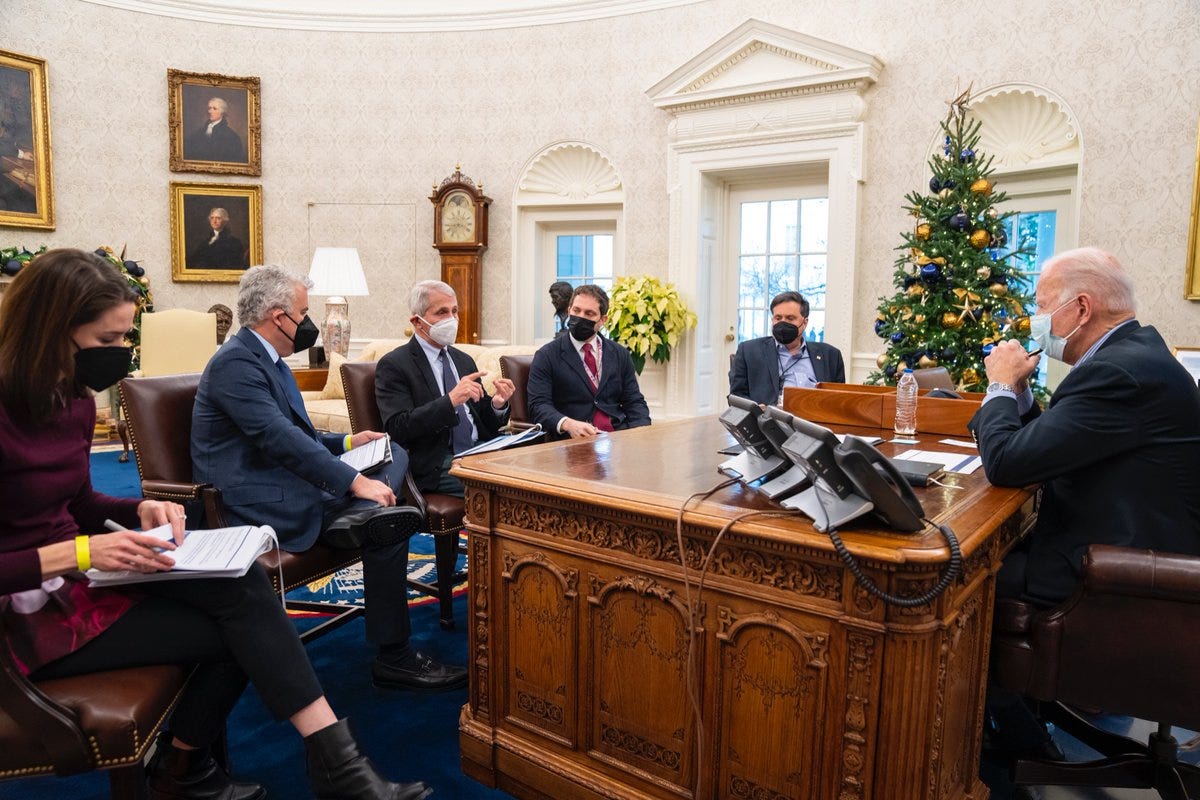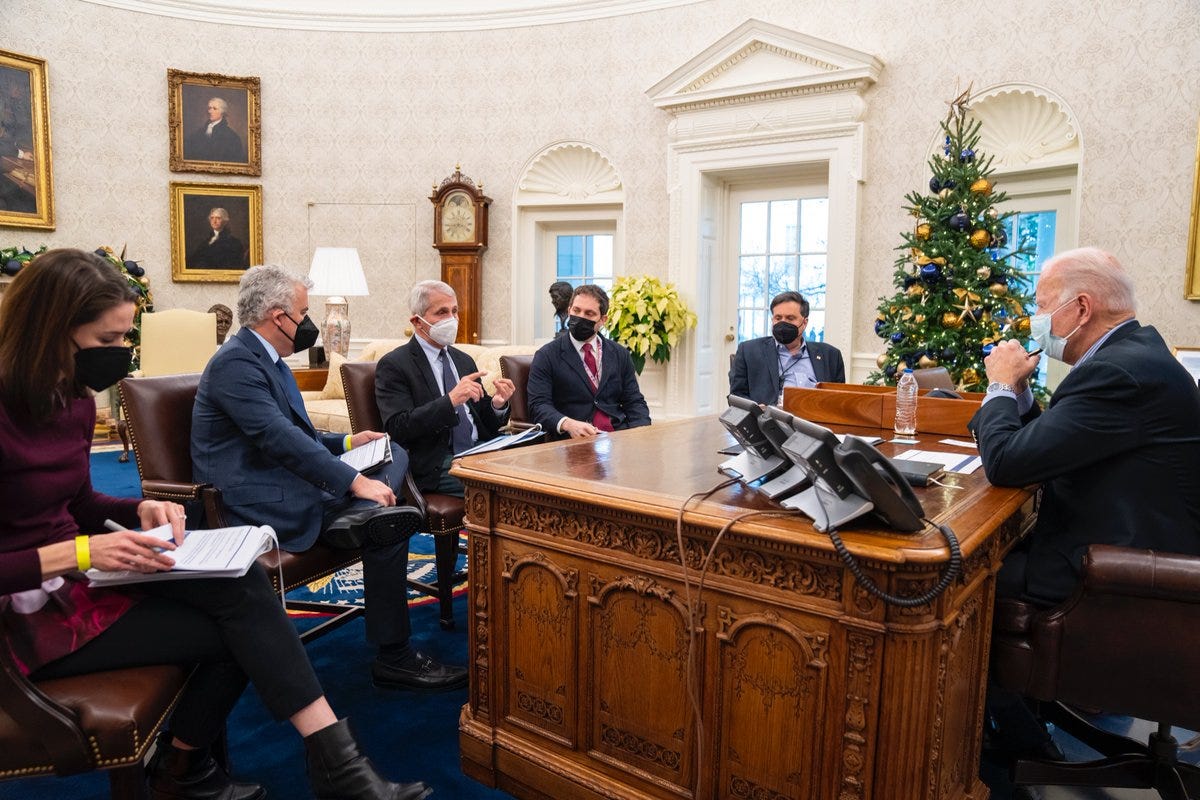Wake Up To Politics - November 29, 2021
Wake Up To Politics: Let’s talk about the Omicron variant
by Gabe Fleisher
Good morning! It’s Monday, November 29, 2021. Election Day 2022 is 344 days away. Election Day 2024 is 1,072 days away.
Welcome back to Wake Up To Politics. I hope you all had a nice Thanksgiving, and a Happy Hannukah to those who celebrate.
As always, it’s much appreciated when you share the newsletter with your friends and encourage them to sign up.
Let’s talk about the Omicron variant
Staring down a pandemic that has now raged on for more than 18 months, Americans are ready to return to normal.
According to an Axios/Ispos poll taken just before Thanksgiving, 67% of Americans were planning to see family and friends from outside of their household during the holiday.
In the same poll, a majority (55%) said “returning to their normal pre-coronavirus life right now is a small risk or no risk to their health.” And about 2.3 million people traveled in U.S. airports on Wednesday, more than any day since February 2020 — a return to pre-pandemic levels.
But, as with every time Americans have been ready to move on from the pandemic in the past year and a half, the coronavirus has other ideas. Here’s what you need to know about Omicrion, the new “variant of concern” that has scientists scrambling:
— Why it’s so concerning: Omicron is not the first coronavirus variant to emerge, of course. But scientists say it’s the most worrying yet. What makes it so alarming? The new variant has about 50 unique mutations from past strains, 32 of which are in the spike protein, the part of the virus that vaccines train the immune system to recognize and combat.
For comparison, the Delta variant — up until now, the most transmissible version of coronavirus — had 10 unique mutations in the spike protein. “This is the highest level of alert we’ve ever been on, by far,” Stephen Hoge, the president of Moderna, told the Washington Post. “What’s most scary about this virus is it’s managed to put all of its greatest hits into [the Omicron variant], and then has added maybe 10 mutations that we don’t even know what to think of yet.”

— What we don’t know: A lot. As Dr. Ashish Jha, the dean of the Brown University School of Public Health, wrote in a New York Times guest essay, there are three pressing questions about the new variant: Is it more transmissible than the now-dominant Delta? Does it cause more severe disease? And will it be able to evade the immune defenses built up by prior infections and the vaccine?
It’s too early to answer any of those questions yet; it will probably be around two weeks before we know more. Early data in South Africa does suggest that Omicron is out-competing Delta and fueling a surge in cases in the country, meaning it could be more transmissible. However, some South African doctors have indicated that the variant is causing more mild cases than its predecessors, although the World Health Organization has said it’s too early to make such a declarative statement.
As for the final question, scientists across the globe are “racing” to find out whether the current vaccines will protect against Omicron. Pfizer, Moderna, and Johnson & Johnson are all already working on updated versions of the vaccines that could respond to the mutations contained in Omicron; new vaccines could be available by early 2022 if necessary.
— Where it’s been detected: As of this morning, confirmed or probable cases of Omicron have been identified in at least 17 countries. Here they are:
Europe: Austria, Belgium, Denmark, England, France, Germany, Italy, The Netherlands, Portugal, Scotland, Switzerland
Africa: Bostwana, South Africa
Asia and the Pacific: Australia, Hong Kong
North America: Canada
Middle East: Israel— What the U.S. is doing: The United States isn’t on that list yet, but Dr. Anthony Fauci, the nation’s top infectious disease doctor, told ABC News on Sunday that “inevitably [Omicron] will be here” soon. The country has already begun taking steps to prepare; starting today, travel will be restricted from South Africa and seven other African countries due to concerns about the new variant.
Governors across the country have also begun preparing for cases of Omicron; Gov. Kathy Hochul (D-NY) became the first to declare a state of emergency on Friday.
As always, developments in the pandemic are not just relevant to public health. They’re political developments, too. If there’s one campaign promise President Biden is most attached to and will be most closely judged on, it’s curbing the pandemic.
Biden repeatedly said during his campaign that he would “shut down the virus,” and he declared “independence from the virus” in July. But the pandemic refused to heed his declarations, first with the Delta-fueled surge over the summer and now with the Omicron variant.
That poses a huge political problem for Biden, whose approval ratings have already veered into dangerous territory ahead of the 2022 midterms. Hoping to avoid a repeat of his dismal Delta experience, expect to hear a lot from the president about Omicron this week. As you’ll see in “Daybook,” he will speak to the nation about the variant later today, which he’ll likely use as an opportunity to encourage more Americans to receive vaccines and booster shots.
Bottom line: There’s only so much Biden can do to combat surges of coronavirus. But polls show Americans are growing dissatisfied with his Covid policies, adding pressure on him to get his response to Omicron right — or face the electoral consequences later on.
What else you should know
→ Esper sues the DOD. “Former Defense Secretary Mark T. Esper on Sunday sued the agency he once led, accusing officials at the Pentagon of improperly blocking significant portions of an upcoming memoir about his tumultuous tenure under President Donald J. Trump.” New York Times
→ McConaughey bows out. “Hollywood actor Matthew McConaughey announced Sunday that he will not run for Texas governor ‘at this moment,’ ending months of speculation that the ‘Dallas Buyers Club’ and ‘Dazed and Confused’ actor would enter the state’s political scene.” Washington Post
→ Iran talks resume. “Iran and world powers will meet in Vienna on Monday to try to salvage their 2015 nuclear deal but with Tehran sticking to its tough stance and Western powers increasingly frustrated, hopes of a breakthrough appear slim.” Reuters
Policy Roundup: Economics
By Wake Up To Politics economics contributor Davis Giangiulio
The new Omicron variant sent stocks tanking on Friday, on fears it could slow economic growth. The Dow fell more than 2.5% in the worst trading day of the year, and at one point was down more than 1,000 points. Atlanta Fed President Raphael Bostic told Fox Business that while there could be slowed growth, he expects Omicron to have a weaker effect on the economy than the Delta variant or the original spread of Covid in the spring of 2020.
But the new variant is creating speculation that economic policy in the short-term could change. Questions are already rising whether the Fed will hold off on hiking interest rates, something that was being considered to curb inflation. If Omicron slows growth, a rate hike could further weaken the economy in a time when it would already be without strong expansion. The panic around the new variant could prove to be temporary, but some are warning until there is certainty around the new variant the market and economy could be quite fragile.

Oil prices fell big on the Omicron news too, now down for a fifth week in a row. That comes after oil declined sharply last week after the news of a lockdown in Austria, amid fears that further pandemic restrictions could be returning and weakening oil demand. It’s leading average gas prices to fall for the first time since prices started surging earlier this year, and some experts think national averages could fall to $3 per gallon if the trend continues.
President Joe Biden announced last week his administration would be releasing 50 million barrels of crude oil from emergency reserves to help lower gas prices. While his administration argues that this will “address the lack of supply” in the oil markets, critics say the level he’s releasing is too small to make a significant impact.
Black Friday sales this year were better than expected, in line with strong consumer spending despite inflationary concerns. Retail sales by mid-afternoon on Friday were up 29.8%, according to Mastercard SpendingPulse, beating their 20% forecast. Online sales this holiday season are expected to total a record $207 billion, up 10% compared to last year. It comes after October retail sales rose by 1.7%, showing that despite weakening consumer confidence surrounding inflation consumers aren’t halting their spending yet.
Daybook
All times Eastern.
→ President Joe Biden and Vice President Kamala Harris will receive their daily intelligence briefing at 10 a.m., followed by a briefing at 10:45 a.m. from the White House COVID-19 Response Team on the Omicron variant.
At 11:45 a.m., Biden will deliver remarks to provide an update on the Omicron variant. The president will meet with a group of CEOs at 2 p.m. to discuss strengthening supply chains ahead of the holiday shopping season and deliver remarks at 3:45 p.m. on the same topic.
→ White House Press Secretary Jen Psaki will hold her daily press briefing at 1 p.m.
→ The Senate will convene at 3 p.m. and resume consideration of H.R. 4350, the National Defense Authorization Act (NDAA). At 5:30 p.m., the chamber will hold a cloture vote on the substitute amendment to the bill, the most recent version of the legislation.
The NDAA, which has been passed every year since 1961, is the annual vehicle for Congress to set policies for the Department of Defense.
→ The House is not in session.
→ The Supreme Court will hold oral arguments at 10 a.m. in Becerra v. Empire Health Foundation. According to SCOTUSblog, the case is a dispute over “the proper application of a complex Medicare payment rule” — and also “a whirlwind of interpretive complication.”





